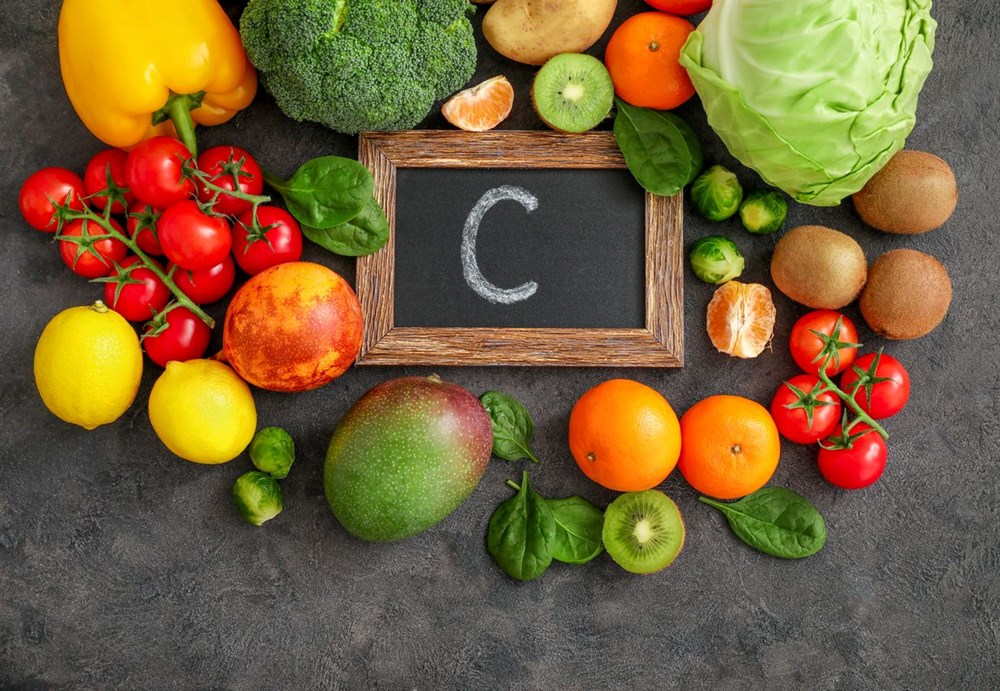

Most of us have been introduced to Vitamin C from an early age. It’s like having a personal coach for your immune system. Vitamin C significantly enhances the production of white blood cells – your body’s primary defense against infections. Additionally, it acts as an antioxidant, combating free radicals that can disrupt cellular health.
If you’re frequently catching colds, experience slow-healing wounds, have bleeding gums, constant fatigue, or dull, dry skin, it might be a sign of Vitamin C deficiency.

Incorporate foods like amla (Indian gooseberry), oranges, lemons, sweet limes (mosambi), guavas, red and yellow bell peppers, broccoli, and spinach into your diet. Start your day with a warm glass of lemon juice or amla juice to boost your immunity.

Vitamin D is often overlooked in discussions about the immune system. While it’s commonly linked to bone health, Vitamin D is crucial for the immune system too. It activates immune cells and helps fend off bacteria and viruses. If you frequently fall ill, especially during winter or after prolonged periods indoors, your body might be signaling a deficiency.

Signs of low Vitamin D include persistent tiredness, frequent respiratory infections, bone or back pain, mood fluctuations, mild depression, and muscle weakness.

Ensure you get 15-20 minutes of morning sunlight on bare skin, free from sunscreen, at least 3-4 times weekly. Foods like egg yolks, fortified dairy products, mushrooms, and oily fish such as salmon can help. If natural sources aren’t sufficient, a simple blood test can reveal your levels, and a doctor may recommend a weekly D3 supplement.
Though zinc often flies under the radar, it’s a powerhouse for immunity. It plays a pivotal role in creating and activating immune cells that combat viruses. Low zinc levels can lead to weakened defenses, resulting in frequent colds, sore throats, and a constant feeling of impending illness.

Typical symptoms of zinc deficiency include frequent colds, slow wound healing, hair thinning, loss of taste or smell, and white spots on nails.
Include zinc-rich foods like pumpkin seeds, sunflower seeds, chickpeas (chana), lentils, kidney beans (rajma), cashews, and almonds in your diet. Eggs and dark chocolate (opt for 70% cocoa) are also good sources. Vegetarians and vegans might need to be more proactive about zinc intake or consider supplements.

Often discussed in the context of anemia, iron is crucial for immunity too. Without enough iron, your body struggles to produce hemoglobin, leading to poor oxygenation of tissues, including those responsible for immunity. This slows your immune response, making you more susceptible to viruses.

Signs of iron deficiency include frequent colds accompanied by fatigue, pale skin or dark circles, brittle nails, hair loss, shortness of breath, and brain fog.
Boost your iron intake with spinach, dates, raisins, lentils, soybeans, red meat, chicken liver, eggs, and seafood. A handy tip: Pair iron-rich foods with Vitamin C (like lemon or amla juice) to enhance absorption. Avoid tea or coffee right after meals, as they can hinder iron absorption.
Vitamin B12 can be a stealthy nutrient; deficiencies often go unnoticed until health issues arise. It’s essential for nerve health, red blood cell production, and immunity. A lack of B12 can impede the creation of new immune cells, giving viruses an advantage.
Symptoms of B12 deficiency include constant fatigue, weak immunity, frequent colds, tingling in extremities, brain fog, forgetfulness, and mood changes.
B12 is primarily found in animal products, making vegetarians and vegans more susceptible to deficiency. Ensure you consume eggs, milk, curd, paneer, chicken, fish, red meat, and fortified cereals or plant-based milks. Supplements might be necessary, especially for vegetarians. A simple test can determine your levels, and a doctor might recommend oral supplements or injections for severe deficiencies.
Ensure optimal hydration: Dehydration impacts your defenses negatively. Opt for warm water, herbal teas, or even turmeric milk (haldi doodh).
Repair your gut: A healthy gut translates to a robust immune system. Incorporate fermented foods like yogurt, buttermilk, pickles, or kanji.
Sleep is sacred: No matter how nutritious your diet is, lack of sleep can compromise immunity. Strive for 7-9 hours of sleep.
Exercise regularly: Engage in light to moderate activities like yoga, walking, or strength training to boost circulation and immunity.
Limit sugar: Ultra-processed foods and excessive sugar can suppress immune function. Aim to reduce, not eliminate.
ENGLİSH
5 gün önceSİGORTA
5 gün önceSİGORTA
5 gün önceSİGORTA
8 gün önceSİGORTA
10 gün önceSİGORTA
10 gün önceDÜNYA
19 gün önce 1
Elon Musk’s Father: “Admiring Putin is Only Natural”
11563 kez okundu
1
Elon Musk’s Father: “Admiring Putin is Only Natural”
11563 kez okundu
 2
xAI’s Grok Chatbot Introduces Memory Feature to Rival ChatGPT and Google Gemini
10596 kez okundu
2
xAI’s Grok Chatbot Introduces Memory Feature to Rival ChatGPT and Google Gemini
10596 kez okundu
 3
Minnesota’s Proposed Lifeline Auto Insurance Program
9478 kez okundu
3
Minnesota’s Proposed Lifeline Auto Insurance Program
9478 kez okundu
 4
Introducing Vivo Y300 Pro+: A Blend of Power and Affordability
7416 kez okundu
4
Introducing Vivo Y300 Pro+: A Blend of Power and Affordability
7416 kez okundu
 5
What’s New in iOS 19: Updates and Compatibility
6098 kez okundu
5
What’s New in iOS 19: Updates and Compatibility
6098 kez okundu
Veri politikasındaki amaçlarla sınırlı ve mevzuata uygun şekilde çerez konumlandırmaktayız. Detaylar için veri politikamızı inceleyebilirsiniz.